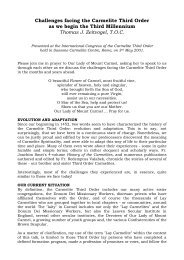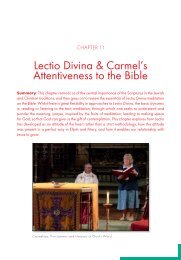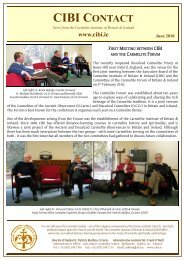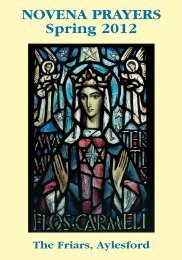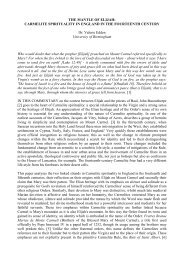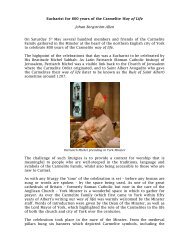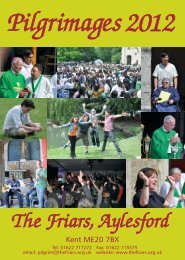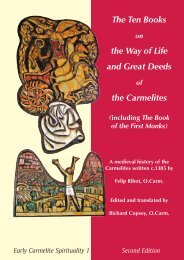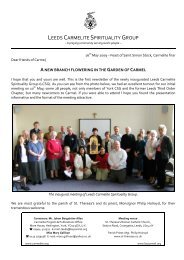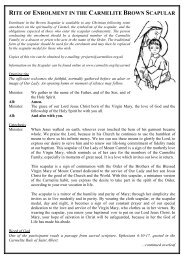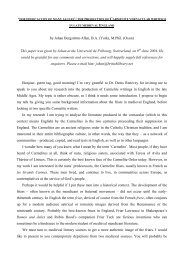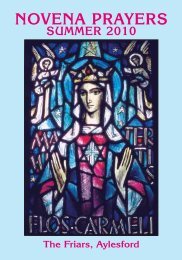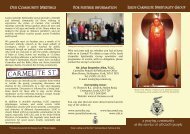Saint Albert of Trapani - British Province of Carmelite Friars
Saint Albert of Trapani - British Province of Carmelite Friars
Saint Albert of Trapani - British Province of Carmelite Friars
Create successful ePaper yourself
Turn your PDF publications into a flip-book with our unique Google optimized e-Paper software.
Even though the Lord rarely permits it, possession by the devil prevents a<br />
full life, and the man <strong>of</strong> God is able to restore wholeness, self-control and<br />
openness to the will <strong>of</strong> the Lord.<br />
What counts about these actions, leaving aside their historicity and their<br />
importance, is their meaning: they signify to us that <strong>Albert</strong> is a saint, a<br />
prophet, a man <strong>of</strong> God, who still shines for us today as a person made new<br />
by the Gospel, so united with the Lord and so permeated by his Word that<br />
his every action becomes a practical and eloquent continuation <strong>of</strong> the healing<br />
and liberating action <strong>of</strong> Christ.<br />
7. <strong>Saint</strong> <strong>Albert</strong> and the Jews<br />
Today there is a quite widespread understanding <strong>of</strong> the relationship<br />
between Christians and people <strong>of</strong> other religions which is very different<br />
from the one that was normal in the past, even until quite recently, and<br />
which still today is not found in some other religious and cultural contexts.<br />
Faith is such an intimate reality that it concerns and marks a person’s entire<br />
life, it orients the way he or she sees the world and the personal choices he<br />
or she makes at every level. Education, culture, social context, these things<br />
also greatly influence the way one views one’s own religion and those <strong>of</strong><br />
other people. Today, also, the secularised Western world is infected with<br />
relativism, for which there is no single truth. Moral principles are cast in<br />
doubt and subjected to the exclusive and sovereign assessment <strong>of</strong> personal<br />
conscience (or opportunity) so that many people think that the forms <strong>of</strong><br />
religious expression are indifferent or equivalent.<br />
The problem is a serious one, not to be resolved by propaganda, slogans<br />
or crusades. On the other hand, it’s not only a matter <strong>of</strong> dialogue, <strong>of</strong> mutual<br />
knowledge, welcome and appreciation, but also <strong>of</strong> proclaiming the Gospel<br />
through an authentic testimony. That means having to place oneself with<br />
humility and patience alongside every man and woman, respecting their<br />
dignity, appreciating their point <strong>of</strong> view and their culture, adapting oneself to<br />
their times and rhythms. Above all it is necessary to put forward our<br />
experience <strong>of</strong> the resurrection <strong>of</strong> Christ from death, and therefore <strong>of</strong><br />
salvation and new life experienced through union with him in the Church,<br />
while still acknowledging the universal value <strong>of</strong> the incarnation, passion,<br />
death and resurrection <strong>of</strong> Christ, which implies the gift <strong>of</strong> the Holy Spirit to<br />
humanity and its presence in every life, even before the explicit<br />
proclamation <strong>of</strong> the Gospel. Moreover, the Jewish religion is a special case:<br />
John Paul II addressed the Jews as “our older brothers”, which is a very<br />
different attitude from when they were called “perfidious” or even<br />
“deicides”. What was <strong>Saint</strong> <strong>Albert</strong>’s attitude



